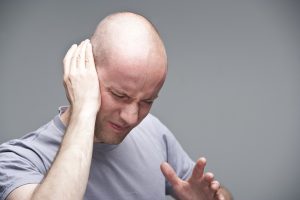
Causes of Tinnitus
Tinnitus can affect one or both ears and is not a disease, but a symptom of underlying conditions. It can often be a symptom of:
- Ear Cell Damage – When these delicate cells are damaged, they can send messages along the nerve endings to your brain telling it that you are hearing noises.
- Meniere’s Disease – This is a disease of the inner ear caused by abnormal pressure in the fluid of the inner ear.
- Ear Bone Problems – Typically caused by genetics, stiffening of the bones in the middle ear or abnormal bone growth can be a cause.
- Ear Infections – Fluid buildup in the middle ear cause blockages which can lead to ear infections.
- Blood Vessel Diseases – While it is rare, tinnitus can be a symptom of a blood vessel disorder such as:
- Brain or Neck Tumors
- High Blood Pressure
- Atherosclerosis
- Malformed Capillaries
- Kinking of the Neck arteries
- Noise-Induced Hearing Loss – This often results in a short term issue and can be the result of exposure to loud music or noises for a long period, such as going to a concert.
- Age-Related Hearing Loss – As you age you will notice a reduction in hearing in one or both ears which can lead to noise problems.
- Excessive Ear Wax – When too much ear wax accumulates in the ear, it can become difficult to remove, which can lead to hearing loss and ringing sensations.
- Temporomandibular Joint Dysfunction – Problems with this joint can lead to ringing and other noises in the ear.
Symptoms of Tinnitus
The primary symptom includes noises that occur in either one or both ears and the symptoms can stay for long periods of time or may come and go. Some of the types of noises associated with the condition include:
- Roaring
- Clicking
- Hissing
- Ringing
- Buzzing
If these symptoms persist, or get to the point of interfering with your concentration or daily life, it is important to address the issue with a doctor to determine the underlying problem and what treatment would be best.
Types of Tinnitus
There are two primary types, which can be broken down into:
- Objective – This is a rare form of tinnitus that is often caused by bone conditions or blood vessel issues and the noises can be heard by the doctor.
- Subjective – This is the most common type of tinnitus and involves noises that can only be heard by you. This type is most often associated with hearing conditions, ear wax, problems with the ear, or problems with how the nerves react with the brain.
Treatments of Tinnitus
Once you talk to your doctor, they will determine what is causing the tinnitus and come up with a treatment plan.
Prescription Medications
While medications will not cause the noise to go away completely, it can lessen it and make daily activities easier. These medications can be habit forming and often have side effects, so they are only used when the case is severe or when the benefits outweigh the side effects.
- Anxiety Medications
- Tricyclic Antidepressants
Lifestyle Changes
Lifestyle changes have also been known to help ease mild cases. Patients are urged to:
- Reduce Stress
- Use a Sound Machine
- Limit Alcohol Consumption
- Quit Smoking
Behavioral Therapies
Behavioral therapies are used to help you learn to cope better and reduce the negative thought patterns that your problems may cause. Some therapies include:
- Mindfulness-Based Stress Reduction– This helps you to learn more about your issue and coping mechanisms that will help.
- Tinnitus Activities Treatment – This treatment helps you to address and control areas of your life that your condition affects, such as sleep or concentration.
- Cognitive-Behavioral Therapy – This type of therapy helps you to replace negative thoughts with positive ones to help aid in reducing stress.
- Sound Therapy and Hearing Devices – Sound therapy and hearing devices are also used to lessen the noise and help make daily activities easier. Some doctors may suggest:
- Masking Devices – Machines, such as white noise generators, can suppress the sound by emitting a constant low level of noise.
- Hearing Aids – With a variety of specialty hearing aids available, you can often find one that reduces the noise by helping you hear better.
- Tinnitus Retraining Therapy – This therapy involves counseling, and helps to improve your perception. It involves wearing a device that emits a broad band noise that helps to reduce the sounds from the condition.
If you find yourself suffering from any of the above symptoms of tinnitus and would like to look at treatment options, contact us for an appointment today!



